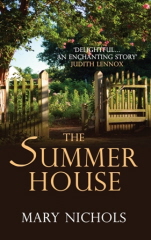- Farewell
- Introduction
- All Mary's Books
- Coming Soon
- More about Mary Nichols
- Links
- Search
- Contact Me
- Acknowledgments
- Blogs
- Most recent blogs
- Archive
- 2014
- 2013
- Building family anecdotes into a novel
- Collective Noun for a group of Romantic Novelists
- Village Brickmaking
- Writing Historical Novels for Mills & Boon
- Plot and Character in Historical novels
- Norfolk roots
- Developing that first Idea
- A Weekend to Remember
- Writing and Selling historical novels
- Using the Second World War as a setting
- What makes a good novel
- Doing the Research
- Spring in the Garden
- Historical novels: getting the setting right
- Writing Novels set against an historical background
- Mothers' Day
- Romantic Novelists' Association Annual Awards
- Shortlisted
- Do you need to be a historian to write historical novels
- 2012
Writing historical novels: getting the setting right.
Sun, 24/03/2013 - 11:24 — Mary
This is the third of my blogs to go on www.writinghistoricalnovels.com in which a group of writers of historical fiction write each month on the subject.
Getting the setting right is particularly important when writing historicals. The setting and period must be right for the story you are planning to tell and the problems and adventures the characters are going to encounter. Sometimes the idea for the story comes to me complete with its period; it could not be written around any other time, be it Regency, Georgian or Victorian. Or it might lend itself best to a twentieth century setting, whichever you choose, it needs to be established right from the word go, so the reader is in no doubt. It must be galling to think you are reading a Regency story only to find after half a dozen pages, it is Edwardian or Victorian, or even earlier.
Fashions, furnishings, means of transport and communication must be right for the period. You need to dress you characters correctly for their time and status, and what they ate and how often, should also be researched. The gargantuan appetites of the rich in Georgian and Regency times need to be set against the meagre rations of the poor.
If you are dealing with stage coaches, you need to know how long they took to get from A to B, how often the horses were changed and the route they were likely to follow and how much had to be laid out for fares, refreshments and overnight accommodation. The mail was more expensive than the stage and post chaise even more so and reserved for the very wealthy. You wouldn’t get on a train before the middle of the 19th century and even then it would be an innovation, or make a telephone call before the first world war and working class homes didn’t have them in the second world war either.
It is important to know how long news took to reach distant places, or if certain facts were withheld from the general public and your characters couldn’t have known them. If it is necessary for the story then you will have to invent a really good reason for how they came to know it. In my latest book, ESCAPE BY MONLIGHT, one of my characters is in occupied France during WW2 and I needed to find a way for her family in England to learn what she was up to. I did it by having her father working in Intelligence for the SOE (Special Operations Executive).
Taboos and morals, too, change over the years. What is right for one period would be frowned on in another; sex outside marriage and having babies, for instance. It went on, of course, - it always had - but the difference is in how it was dealt with. It was a disgrace in the 1930s and an even greater one in the era of the Great War, a point I made in my book THE SUMMER HOUSE. 
You need to know how crime was tackled too, how people were brought to court and the punishment they were likely to receive. And if you are writing about war, then you need to know the kind of weapons used and the uniforms of the protagonists, how the men lived when campaigning and how their womenfolk managed. Bernard Cornwell did it brilliantly in his Sharpe books. So did C S Forrester and Alexander Kent, aka Douglas Reeman.
Dialogue must reflect the times without becoming stilted. If we stuck slavishly to the way people spoke in Medieval times, for instance, it would become almost unreadable. You need to give a taste of the era in the way people speak but not overdo it. The same could be said of dialect; too much and it annoys the reader who has to puzzle what it means, too little and you loose the sense of locality. Slang must be used with caution because it is so volatile. Georgette Heyer used a lot of slang but it was part of the charm of her books. Whether it was always entirely accurate is another matter.
But however thorough the research, it is important not to give in to the temptation to put it into the book willy-nilly just to prove you know it. It should be like an iceberg; nine tenths below the surface, one tenth visible. It is there to put the period and surroundings into perspective. You use only what is necessary set the scene and take the story forward.
